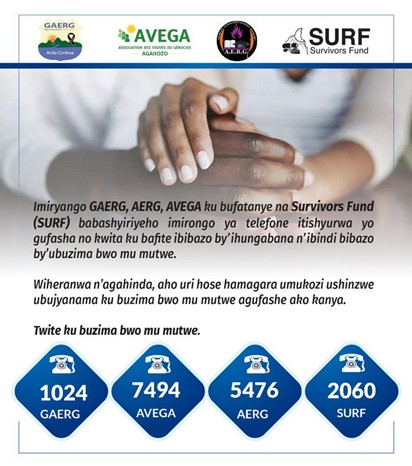
Due to the start of the COVID-19 pandemic in 2020, survivors were not able to commemorate the loss of their loved ones during the annual commemoration period. Because of the government’s stay-at-home and COVID-19 prevention measures, it was not possible for anyone to hold events, conduct vigils or gather within their communities to remember loved ones.
Consequently, this exacerbated traumatic disorders among many survivors and required extending access to additional counselling services. Individual and group counselling activities were impossible to deliver during the lockdown. This led first to the COVID-19 Emergency Response Project (CERP), and then to the Counselling Extension Response Project (CERP II). SURF, in collaboration with its partners and with funding through the Clifford Chance Cornerstone Initiative provided access to phone-based counselling and supplementary support to vulnerable survivors of the genocide, and related vulnerable persons, from April 2021 through to October 2022.
The need and demand for the counselling services made accessible through CERP II are greater than ever, in part due to the reduction in government funding for dedicated counselling services for survivors. The take-up and effectiveness of the helplines and peer counselling made possible by CERP II has proven to be more impactful than ever (significantly increasing since CERP) due to greater awareness of the support that is available and how to access it. The Counselling Enhanced Reach Project (CERP III) intends to realise the ambition and potential of the project to ensure that survivors can continue to access the counselling support that they require, through to the 30th Anniversary of the Genocide against the Tutsi, and then embed the model so that such support continues to be available beyond the end of Clifford Chance funding. The project is for 23 months from 1st December 2022 to 31st October 2024.
The project has four objectives:
– Enhance access to, and the reach of, mental health support
– Extend awareness of the availability of the helplines
– Expand delivery of mental health support and emergency assistance
– Embed monitoring and learning from the project
Activities will include:
– building the confidence of survivors, and related vulnerable persons, to access counselling support through mainstream services (to combat the perception that they are otherwise excluded from them) with support from counsellors that will continue to be available through four free national helplines and locally through a network for 96 trained Peer Support Counsellors
– sensitising, and improving the skills of workers in mainstream services to more sensitively and appropriately provide counselling support to survivors, and related vulnerable persons (so they are more willing/able to access them) through training of Community Health Officers in key districts across Rwanda, and enabling them in turn to train a larger cadre of Community Health Workers
Over the period of the project we expect that at least 6,000 vulnerable survivors will receive one-to-one support from the 4 counsellors through the toll-free lines, as well a further 20,000 vulnerable survivors will receive support from the network of 96 Peer Support Counsellors. Over 100,000 other vulnerable persons will benefit from the support made available through the radio counselling programs and recorded helpline.
Though we will not be able to track accurately the indirect reach resulting from the training of the 200 Community Health Officers, we expect this will help better educate and inform 600 Community Health Workers working local health centres and clinics across 15 districts of the Southern and Western Province of Rwanda to extend support to a further 20,000 survivors, and related vulnerable persons, who will be helped over the duration of the project to access counselling through mainstream service as a result of the sensitisation and work with them.
The mental health support will be available and accessible to any vulnerable person, though vulnerable survivors in particular will be targeted to be made aware of the service and support. We will continue to prioritise for emergency assistance households headed by the most vulnerable survivors in the 3 Districts of Kigali City (Gasabo, Kicukiro and Nyarugenge), and then those in the Eastern and Southern Provinces (where the number of vulnerable survivors is greatest).
The project will continue to be delivered in partnership with SURF’s Local partner organisations in Rwanda including AVEGA Agahozo, AERG, GAERG and Ibuka.
